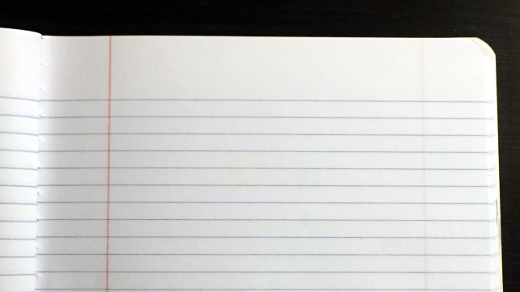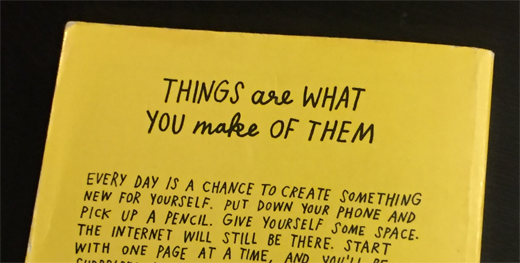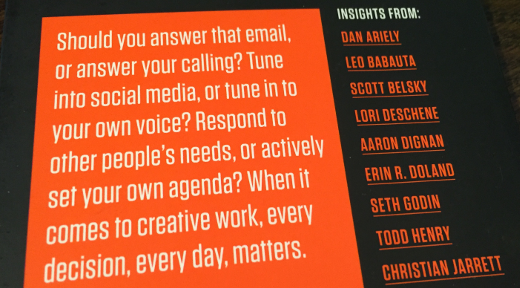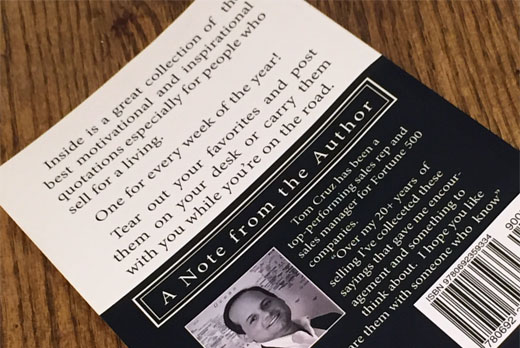My Takeaways So Far From The Book 1 Page At A Time
A consequence of being in a routine is that our entire body can be consumed by it. Where things like repetitive strain injuries or simply being sore from sitting on our butt for a long time are obvious, what isn’t as apparent is the impact on our brain.
If you don’t believe me, here’s an example – you are buzzing along in what you do all day and someone comes along and asks you a question, and all you can do is stare back dumbfounded. They may have well as used a Sharpie and wrote it on a pool noodle and hit you with it. Call it brain fatigue, but does it show a sign your brain needs some exercising?
When I saw the book 1 Page at a Time – A Daily Creative Companion by Adam J. Kurtz sitting on the shelf at Judy Maxwell Home in Chicago, I couldn’t help but pick it up. (If you don’t know about this store, think Spencer Gifts with an old-world flair and a sharper edge; it’s also owned by actress Joan Cusack, so that adds to its eccentricity) It only took me flipping through the first few pages and I was sold. It is an adult workbook, with a page a day dedicated to a brief creative exercise to do in the book.
Each page presents a unique activity, from making a list to drawing a picture to whatever. Some are quick and easy, some require actual thought. As it’s a page a day, and I started late last year, I am not done yet – thus the “so far” in the title – but I have enjoyed every exercise so far.
Though I have much to go, I feel my takeaways from 1 Page at a Time will endure and be reinforced as I go through it.
Think Different – Borrowing from the infamous Apple tag line, this book does just that. It asks you to do things you most likely don’t normally do on a regular basis as part of your job or even for fun.
Challenge Yourself – As some of the activities have required me to sit back and ponder before putting pen to page, it’s been extremely helpful to have a challenge that is outside of my normal work and life challenges, which tend to be more technical, business and child-focused.
Draw – When was the last time you drew a picture? For the fun of it? This is probably why adult coloring books are all the rage these days. Where many of you reading this may not consider yourself an artist, the drawing I am talking about is not about being an artist. Rather, it is about expressing something with visualization.
On occasion a day or 2 go by when I don’t do a page a day, but then I catch up on them. I tend to do them in page sequential order, but there is no reason you can’t flip around and choose one at random. I never read ahead, as I like to approach these with some spontaneity.
I highly recommend getting a copy of 1 Page at a Time, or get 2 – 1 for yourself and 1 for a friend. If you have it and are using it, I’d love to hear what you think about it in the comments to this post.
This is from The Hot Iron, a journal on business and technology by Mike Maddaloni.
Did you enjoy this? Subscribe to The Hot Iron by RSS/XML feed or Read by Email.
Book Take-Aways • Business • Strategize • Thrive • (3) Comments • Permalink
Ridin’ Writer’s Block Out

A few days ago I experienced something I never have before in my life. And looking back now, that was ok.
I had writer's block.
Over the last decade of blogging I have grown to love writing. What started out as cranking out a few paragraphs for my first dozens of posts here at The Hot Iron has grown to a passion for writing out – ok printing, but on paper – what I have sketched out and organized in my head and then type up to post. This is a similar approach I take with writing for my day job, as well as guest posts I have made on other blogs and sites.
As I write this in the first week into June of 2016, I look back and I did not post anything on the blog during the month of May, making for one of the longest recent stretches for me. Where I can say with confidence I did a lot of other things over the past month, both professionally and personally, I did not spend any “me” time to write. With that as a cloud over my head (ok, a thin cloud, but sun-blocking nonetheless) I tried to force the issue and do some writing.
A window of opportunity presented itself, with a meeting being canceled during noontime, and I saw this as my chance to get in some writing. I grabbed my notebook, pen, and headed for one of the few local Starbucks where I have written much of what I have written in the last year. After pouring a little whole milk in my grande dark roast I spotted an open seat at the tall table where I like to sit, put my stuff down, took a sip as I opened my notebook... and just stared at the blank page.
And I stared for what seemed like an eternity. I had a couple of topics to choose from, however nothing seemed to go from my brain to my hand to my pen. I even tried to go back and look at something I had started previously, and simply X'ed it out writing “trash” over it. Trying harder to focus didn't work either, as my mind was more focused on the sounds of the espresso machine and Frappuccino® blender, not to mention the people walking outside of the store. I was besides myself as I had been able to focus while sitting at this very same table where in the past the other 5 stools were occupied by police officers and I was able to tune them out! Realizing I had spent about 40 minutes and was only able to choke out not even 1 page of something I haven't looked back on yet, I closed my notebook, grabbed my coffee and made my way back to the office.
Not My Time
As I sauntered back to the office, frustration segued to reality as it came to me – this was not the time to try to write. Where everything else lined up into place – an hour of time, dark roast available brewed and not as a pour over – the one thing that was not ready was my brain. I had too many things on my mind, everything from the work I had to go back to when I returned to the office as well as everything else going on in my life. Forcing it right then and there wasn't going to change the situation, so I just needed to find another time to do it. Like right now, several days later, where the words are flowing faster than I am able to type them.
In the end I simply need to ride out writers block. And that phrase – ride out – came to me as well as I was walking back to the office, where the only real thing I was concerned with was avoiding panhandlers and other pitch people on the sidewalks. Of course my brain, which was schooled in 80's rock music, quickly dropped a needle on an old REO Speedwagon album, playing “Ridin' The Storm Out” over and over as I wrote this. However unlike the other day, the song served as an inspiration and not an impediment.
Deconstructing a Writer's Block
Over the years I certainly wouldn't say every time I sat down to write was an ideal time. This one time was the worst of them all. No beating myself up over this “lost” 40 minutes is necessary either. Had it not been for it, I wouldn't have written what you are reading now, or thought of that REO Speedwagon song, or gotten myself psyched up to write some more. The creative process can't always be controlled.
If you're not familiar with the song in my head, you can watch the video embedded below, or if you can't see it you can click on this link to view it on YouTube. Interestingly, this video was recorded on my 18th birthday.
This is from The Hot Iron, a journal on business and technology by Mike Maddaloni.
Did you enjoy this? Subscribe to The Hot Iron by RSS/XML feed or Read by Email.
Blogging • Strategize • Thrive • (5) Comments • Permalink
Why Chicago Needs Dedicated Festival Grounds

The motto of the city of Chicago, Illinois is “urbs in hortu” which is Latin for “city in a garden.” The motto for Chicago is not “festum in urbs” or “festival in a city,” yet festivals large and small draw people to the city – to visit as well as to live – and contribute tremendously to the unique place it is.
It is the large festival concerts that of course draw the largest crowds, including myself. For me personally, there is nothing else like watching live music with tens of thousands of strangers, to say the least! As great and memorable as these festival concerts are – the likes of Lollapalooza, Pitchfork and Riot Fest – they also have an impact long after the last note is played and people leave, namely in the physical damage done to where the concerts are held, which is in public parks across Chicago.
The damage to parks is eventually fixed, and the cost is mostly covered by the concert promoter. However in 2014, the concert and amusement festival Riot Fest, which called the city’s northwest side park Humboldt Park its home for the past several years, was denied a permit to return there after neighbors complained about damage not completely repaired and other issues related to crowds. The 2015 concert was held on the other side of the city in Douglas Park.
I can understand the issue of park damage. Lollapalooza, the annual concert that consumes Chicago’s Grant Park along Lake Michigan, takes most of the park out of commission – including use for locals – for many weeks to repair the damage, which in their case and for Riot Fest is usually due to rain and millions of footsteps wrecking grassy areas which need to be replanted or resodded. It’s not only an inconvenience, but people are denied access to a park they pay for with their tax dollars.
While existing spaces and places make a great setting for concerts, namely in aerial photos of the crowds, a solution that could make everybody happy – from concertgoers to neighbors – would be a permanent festival location for such events.
Dedicated festival grounds
What you say, Mike, build out an open space for multi-stage concerts or other large festival activities and events? Yes, I am, and allow me to make the case for such a venue.
There’s plenty of space in Chicago. If you’ve ever traveled across this fair city, whether by train, car or even over it by airplane, there is all kinds of “vacant” land across the city. I use “vacant” in quotes as clearly someone owns it. But it is there, and not being used.
This is not an original idea. The concept of space for events is nothing new. The Midwest is dotted with fairgrounds, with indoor and outdoor facilities. Growing up in Massachusetts, the Eastern States Exposition grounds hosted not only the Big E, the annual 6-New England state fair, but events large and small throughout the year. Also, about 90 minutes north of Chicago is the Summerfest grounds along lake Michigan in Milwaukee, Wisconsin, which is designed and used for varying sized events.
Can be designed for its use. By building out a space for such events, it can be designed for multiple stages and the crowds that will stand and watch them and walk around, ideally not on grass but asphalt. Not to mention having some “permanent” fixtures like real bathrooms! Perhaps the event organizers, including Lollapalooza’s Perry Farrell, could have a say in its design too?
Can be designed to scale. Not all concerts and festivals draw the same size crowds, and the venue can be designed and built to accommodate different sized crowds.
Better accommodations for inclement weather. It’s rare than a little rain (or a lot) doesn’t fall on an outdoor festival event. This can be factored into the design of the venue with shelters and indoor facilities.
Better offering of VIP services. In addition to general admission tickets to such events, VIP tickets are more and more commonplace. Designing this into venues can provide a greater experience, at a greater cost, for VIPs, which can contribute more to the cost of the venue itself.
Better transportation planning. Or maybe simply “transportation planning” as such a venue would have planned transportation options – not to mention working in public transportation, paths and parking to accommodate it?
For all of these great reasons, it doesn’t mean that it will just happen. Especially in a city like Chicago, with burgeoning deficits, its politics and everything else making headlines, it could take years for something like this to ever happen. Plus, the city has a long history of hosting great events with little physical traces of them years later, such as 2 World’s Fairs in 1893 and 1933.
But nothing is ever easy, and because of it, it doesn’t mean we shouldn’t think about it. “Make no little plans. They have no magic to stir men's blood and probably will not themselves be realized.” was a quote from Daniel Burnham, the famous Chicago architect and author of the Chicago Plan, a design for the city that was implemented in part, just like there would be some compromise on such a venue.
Could this happen in Chicago? Should it happen? Does the city have more pressing priorities? I welcome your thoughts and opinions on my idea in the comments of this post.
This is from The Hot Iron, a journal on business and technology by Mike Maddaloni.
Did you enjoy this? Subscribe to The Hot Iron by RSS/XML feed or Read by Email.
Build • Business • Strategize • Thrive • (2) Comments • Permalink
My Takeaways From The Book Manage Your Day-To-Day
So, how is your day going?
Whenever asked that question, or just now as you read it, you may have begun it with a sigh or groan, or some insincere sense of enthusiasm. As much as we can plan days and focus on whatever we need to do, there are plenty of factors working against us and disrupting our momentum. These disruptors will never go away, and our only choice is to try to bring elements in to manage or counter them.
When I heard about the book Manage Your Day-To-Day: Build Your Routine, Find Your Focus and Sharpen Your Creative Mind I said to myself, “self, how can I pass on reading this?” The book is a collection of writings and interviews with 20 “creative minds.” Where some I have heard of, like Seth Godin and Tony Schwartz, most of the rest I had not. Yet each of the contributors were very intriguing, yet practical. Manage Your Day-To-Day is a good read that gets you thinking about your own routines and practices and how to get the “most” from them, whatever “most” means to you.
As I read the book, my takeaways from it were not from the specifics of the book, rather from its big picture, and are as follows.
Misery loves company, but only if you want to be miserable together – As I read the dozen pieces from the 20 authors, nobody was saying that they have overcome chaos and their lives are exactly as they want them. Yet they did admit to challenges and offered both general and specific advice on how they are conquering what challenges them.
You deserve a break today – How many times have you been working on something and someone asks you about lunch, and you are thinking, “gee, I just had breakfast!” (Ok, you can put your hands down now.) I have written man times here at The Hot Iron about the creative process – or if you are so inclined, simply thinking – and the need to get away to change the scenery, recharge the brain and come back with a fresh focus.
In my current role, in the employee handbook for my firm it actually mentions taking breaks during the day just for that reason. As a matter of fact, I am writing this very blog post on one of those breaks. And on the way to the Starbucks where I am writing this, I was able to easily think through something for work that my brain kept tripping on. Where I thought I dropped the ball on something, I actually did not, and completely followed through. A nice thought to have in my head as I return to the office.
Where was Scrum? – As I read this book after reading Jeff Sutherland's book on Scrum, using Scrum would be a perfect way to help you manage the creativity. As a matter of fact, I recently setup my own scrum board for myself, with tasks such as writing this blog post and fixing the closet doors in my kid's bedroom.
I recommend Manage Your Day-To-Day for anyone who is looking for ideas and encouragement on improvement of their productivity or just to add some calm into their lives. This book is one I bought myself after reading about it somewhere – sorry, I forgot, as I have had the book for a while. As I always pass along books, for this one I placed it on a shelf in the kitchen of my office with other books people have left there as a mini-library. It will be interesting if anyone takes it, and even more so if they took it after reading this blog post!
Have you read Manage Your Day-To-Day? I welcome your thoughts on the book in the comments of this post.
This is from The Hot Iron, a journal on business and technology by Mike Maddaloni.
Did you enjoy this? Subscribe to The Hot Iron by RSS/XML feed or Read by Email.
Book Take-Aways • Business • Diversions • Strategize • Thrive • (0) Comments • Permalink
My Takeaways From The Book 52 Motivational Quotations For Salespeople By Tom Cruz
We all sell. Whether the word “sales” is in our job title or not, we all “sell” in some regards. From persuading a solution at work to convincing someone to date us to everything in between and all around, there is some element of selling in our lives.
Where we can succeed in selling, many times we do not. And when we do not, we can react to it in any number of ways. Whether we like it or not, we have to try to sell again. For some, getting back into the proverbial saddle is easy, and for others or just other times, we may need help. One way to get that help is from words of encouragement.
My good friend Tom Cruz has had the word “sales” on his business cards over his entire career (and when I say good friend, I stood up in his wedding and once flew live lobsters out to his house in LA from Boston, but I digress). When I heard he wrote a book titled 52 Motivational Quotations for Salespeople, I knew I had to read it. Of course it is always to support a friend, bit I knew it would be a great collection and motivator as well.
Friend bias aside, I enjoyed this short book. Each quote is on a separate page, allowing you to tear them out and hang them up. As with any book, I had a few takeaways from it:
We need to find what works for us – Reading through a book of motivational quotes in itself won’t necessarily make it a better day. Or maybe it will. We have to find what works for us, though trial and error, and it may be a third-party sharing something with you.
Explore beyond words – We often hear names of people and quotes that have been attributed to them. But who are these people? Were they business or religious leaders? Were they ax murderers or musicians? Does the quote define them or just confuse you? As I went thru this book I ended up searching several names I did not know.
Write your story – Where these quotes are just that, individual sets of words from others, combined they are part of my friend Tom Cruz’s life journey, and thus tell part of his story. We all have a story to tell or at least record for curious others – now or in the future – whether our child or a stranger. No matter who, our story may be of interest to someone someday.
Note Tom did not ask me to write this, nor did he give me a copy of it. I will make sure to give him a signed copy of my future book someday! As I pass along book I read to others, I am sending this one to a common friend of both of ours, who also works in sales, and should publish his own book too.
Were you intrigued or inspired to get 52 Motivational Quotations for Salespeople? Have you thought of publishing your own quotes? I welcome your thoughts in the comments to this post.
This is from The Hot Iron, a journal on business and technology by Mike Maddaloni.
Did you enjoy this? Subscribe to The Hot Iron by RSS/XML feed or Read by Email.
Book Take-Aways • Business • Thrive • (0) Comments • Permalink






